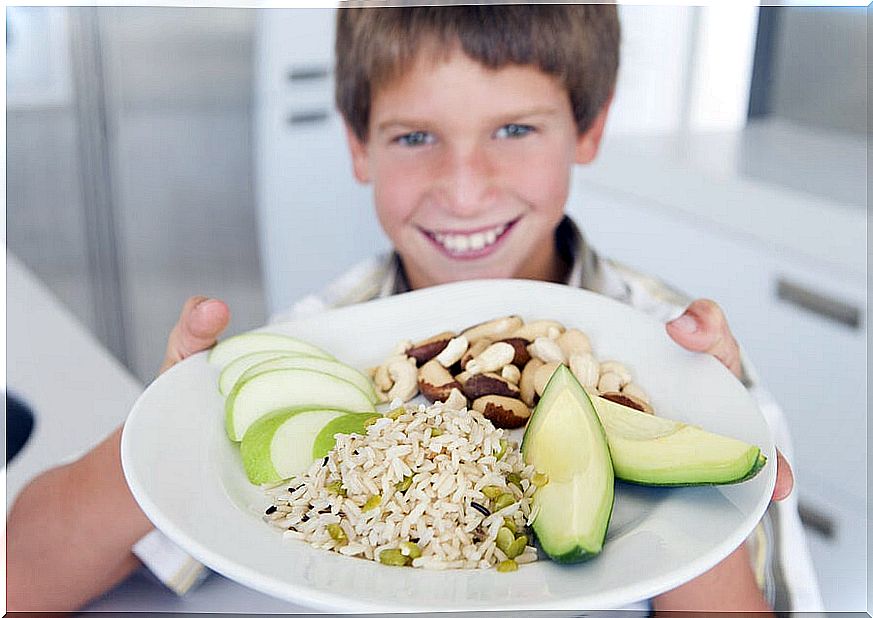How Does Diet Influence School Performance?

If your child is unmotivated, has trouble concentrating, or at school has caught his eye, maybe you should pay attention to what he is eating. Although many do not consider it, food influences school performance.
During school time, we pay special attention to following certain sleep habits, play routines and study; However, do we watch what our children eat? If we kept in mind that food has a great impact on school performance, perhaps we would begin to analyze more what is put on the table each day.
The human brain remains a great enigma. This organ is the central computer that governs all our functions and represents 2% of our total body mass.
It is made up of one hundred billion nerve cells and one billion trillion neuronal connections, which respond to cognitive ability. Its development begins in the early stages of pregnancy; By 6 years of age, it will have already reached 90% of its growth.
While it is true that there are many factors that intervene for the brain to develop well, it is also true that a good diet can promote optimal absorption of nutrients. It also influences the development of language, memory, psychomotor skills, attention and even mood.
Therefore, it is not surprising that there are numerous investigations that try to determine what type of diet is best for us, especially the youngest, to have a healthy cognitive development.
In this sense, there is a study carried out in more than 1,300 Spanish children between 10 and 14 years of age in which it was concluded that the Mediterranean diet improves academic results. What else should we know about it?
The foods your children need
When talking about how food influences school performance, we must not forget that the brain is constantly generating new neurons; This activity accounts for 20% of children’s energy consumption. So, a diet that provides them with all the nutrients they need is essential for them to grow healthy.
Omega 3 and 6 for good connections
In general, oily fish contains omega 3 fatty acids (DHA), which are essential for the brain to be able to transmit the electrical impulses it generates. In addition, they facilitate nerve connections and have to do with learning and memory processes. You will find it in salmon, anchovies, sardines, walnuts and chia seeds, among others.

Carbohydrates for energy
They are the gasoline of the brain, those that provide energy when transformed into sugar. Be careful with this: the really interesting ones are the so-called slow absorption, which means that we always have glucose available. They are whole grains, pasta and potatoes, for example.
On the contrary, you should avoid giving them refined sugars, since the energy they provide is instantaneous, but disappears in a short time. Thus, a seesaw is created in the body that is highly undesirable.
The brain of children does not yet have the ability to make an optimal carbohydrate reserve , so it is very important to give them foods that constantly provide glucose.
Serotonin for wellness
Tryptophan is one of the essential amino acids capable of manufacturing serotonin; It is the substance in charge of well-being, concentration and mood. We can find it in eggs, meat and fish, sunflower seeds, chocolate – the purer the better – and turmeric.
Hill to have strong neurons
Neurotransmitters are responsible for passing information from one neuron to another; For this, we need vitamins of group B, such as choline, present in eggs. We can also find it in nuts or milk.
Fatty acids for the agility of neurons
Nuts, avocado and olive oil have mono and polyunsaturated fats, which promote memory and help neuronal functions to be much more efficient. They are perfect as healthy snacks to promote a type of diet that influences school performance.
Calcium to relax
Calcium directly affects nerve impulses; its deficit can generate hyperactivity or, conversely, fatigue. In addition to being essential for healthy bones, at the brain level it will allow children to concentrate better and help them avoid falling into stress circles. Sesame seed is a rich source of calcium, as are nuts, green leafy vegetables or milk.
Proteins and iron for mental alertness
Beyond meat, legumes contain both protein and iron in large amounts. In them we will find all the nutrients for the brain to generate new neurons and for oxygen to reach each nerve cell. Mental agility and intellectual performance have to do with a good intake of both.
Vitamins and minerals against neuronal degeneration
Potassium, magnesium, and lycopene are helpful in protecting the brain from cell damage. The antioxidants found in berries, bananas or tomatoes are our allies against cell aging.

Final recommendation
Finally, avoid ultra-processed foods at all costs to see how food influences school performance. From time to time nothing happens, but these should not represent the basis of the infant’s diet, since it is proven that they can be carcinogenic, according to an opinion of the World Health Organization (WHO).
Ultimately, it is recommended that you ensure that they drink enough water. Dehydration is very common and can lead to inattention, confusion, memory loss, fatigue, muscle weakness, and other more serious problems.










